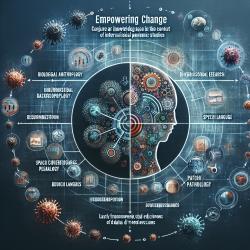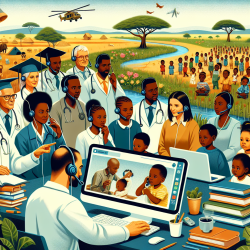Introduction
The COVID-19 pandemic has underscored the importance of understanding the multifaceted nature of pandemics. As practitioners dedicated to improving outcomes for children, it is crucial to integrate insights from interdisciplinary research, particularly from fields like biological anthropology. This blog post explores the key findings from the research article titled "Pandemics, past and present: The role of biological anthropology in interdisciplinary pandemic studies" and discusses how these insights can be applied to enhance therapeutic practices in speech-language pathology.
The Role of Biological Anthropology
Biological anthropology offers a unique lens through which we can study pandemics. By examining human biology, health, culture, and behavior, biological anthropologists provide valuable insights into the causes and consequences of pandemics. The research by Dimka et al. (2022) emphasizes the importance of understanding pandemics at multiple levels, including the persistent social inequalities in morbidity and mortality related to sex, gender, race, ethnicity, and pre-existing health conditions.
Interdisciplinary Research and Its Implications
The interdisciplinary approach to studying pandemics allows for a comprehensive understanding of the biosocial complexities involved. By integrating historical and cross-cultural perspectives, biological anthropologists can contribute to the development of more effective public health policies and interventions. This approach is particularly relevant for speech-language pathologists who work with children affected by pandemic-related stress and stigma.
Applying Insights to Speech-Language Pathology
As practitioners, we can leverage the insights from interdisciplinary pandemic studies to improve therapeutic outcomes for children. Here are some actionable steps:
- Address Social Inequalities: Recognize the impact of social determinants on children's health and tailor interventions to address these disparities.
- Incorporate Cultural Sensitivity: Integrate cultural understanding into therapy sessions to better connect with children from diverse backgrounds.
- Focus on Mental Health: Acknowledge the psychological impact of pandemics on children and incorporate strategies to support their mental well-being.
- Collaborate with Other Disciplines: Engage with professionals from various fields to develop holistic approaches to therapy.
Encouraging Further Research
The research by Dimka et al. (2022) highlights the need for continued interdisciplinary collaboration in pandemic studies. Speech-language pathologists are encouraged to engage in research that explores the intersection of pandemics and therapeutic practices. By contributing to this growing body of knowledge, practitioners can help shape more effective interventions for future pandemics.
Conclusion
Incorporating insights from interdisciplinary pandemic studies into speech-language pathology can lead to improved outcomes for children. By understanding the complex interplay of biological, social, and cultural factors, practitioners can develop more effective and equitable therapeutic approaches. To read the original research paper, please follow this link: Pandemics, past and present: The role of biological anthropology in interdisciplinary pandemic studies.










